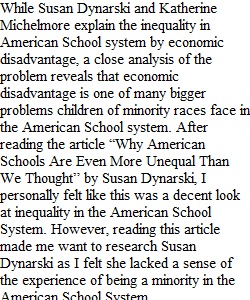


Q We will use this discussion area read one another's drafts-in-progress. Before you get started, please read the assignment for this unit's essay, and note the amended due dates for this unit's activities on the Unit Overview. This unit's Peer Review will be focused on what composition researchers call "higher-order concerns"--that is, rather than proofread each other's papers, we will respond to weightier issues, such as focus (your thesis), development (your arguments), the rhetorical strategies you use to communicate your perspective, and the organization of your essay. It may seem strange to begin revising and expanding your essay before you have even seen your instructor's feedback. In fact, this unit's essay assignment is meant to teach you that revision is not about "fixing" errors or problems as much as it is about re-envisioning a piece of writing. This unit, you will use the articles you located to re-envision and revise your essay from last unit. You will use the feedback you receive in this thread to determine and implement a revision plan. Please note that because of the amended due date for posting in this thread, you might not yet have my thoughts on your essay from last unit. Again, this is intentional. Too often, we get in the habit of revising only based on a teacher's commentary and not on our own thoughts or the feedback of other peer readers. Assessment: See the Grading and Assessment content item under Course Information. A NOTE ABOUT BALANCE: So that everyone benefits as much as possible from this process, respond to an essay that has not been read yet or that has only one response before adding a third response to another essay. An essay should not have three responses if other essays posted in the thread have just one response. It is, of course, possible for an essay to receive three or more responses, but in fairness to everyone in the class, see that peer response is distributed evenly when possible. Peer Review Process The process for this unit's peer review will be as follows: Step One: As early in the unit as possible, but definitely by Wednesday midnight CST, prepare your draft-in-progress for Essay #3. This will require you to spend Monday-Wednesday beginning to find articles and revising last unit's essay based on what you learn from research. Step Two: Attach your draft to your discussion post in .doc, .docx or .pdf by Wednesday midnight CST. In the body of your post, give us a paragraph or so of context. Describe how you have revised last unit's essay so far and why. Additionally, tell us what kinds of feedback you are looking for (for example, feedback on your thesis, a particular argument you make, your introduction, the way that you have incorporated the new research material, etc.). This will help your peer reviewer provide meaningful feedback. Step Three: Identify another student whose essay has not yet been peer-reviewed. Read the essay and respond to the writer no later than Friday midnight CST, with answers to all of the following questions (adapted from Greene and Lidinsky): 1. Are the questions and issues that motivate the writer clear? How can this context be clarified? 2. What is the writer's thesis, his/her main argument, focus? 3. Has the writer effectively related the conversation that published writers are engaged in? How so? What work remains to be done to better contextualize the writer's thesis? 4. Is the writer addressing the audience's concerns effectively? Anticipating counter- arguments? 5. What passages of the draft are most effective? Why? 6. What passages of the draft are least effective? Why? 7. As a reader, I suggest this writer focus his/her revision efforts in this way: ___________ 8. Respond to the writer's specific questions. Note: you will need at least 300 words to response appropriately and substantively. Step Four: Return to this thread periodically before Sunday to ask and answer any follow-up questions.
View Related Questions